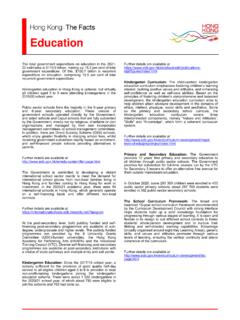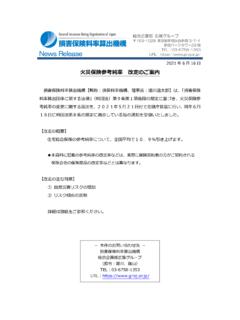Transcription of Arizona Code of Judicial Conduct - Arizona Judicial Branch
1 Arizona CODE OF Judicial Conduct Arizona Supreme Court Rule 81, Rules of the Supreme Court, Amended as of January 1, 2021 [This page is intentionally left blank] Arizona CODE OF Judicial Conduct CONTENTS Preliminary Sections Preamble [1] Scope [2] Terminology [3] Application [5] Canon 1. A judge shall uphold and promote the independence, integrity, [9] and impartiality of the judiciary and shall avoid impropriety and the appearance of impropriety. Rule Compliance with the Law [9] Rule Promoting Confidence in the Judiciary [9] Rule Avoiding Abuse of the Prestige of Judicial Office [10] Canon 2.
2 A judge shall perform the duties of Judicial office impartially, [11] competently, and diligently. Rule Giving Precedence to Judicial Duties [11] Rule Impartiality and Fairness [11] Rule Bias, Prejudice, and Harassment [11] Rule External Influences on Judicial Conduct [12] Rule Competence, Diligence, and Cooperation [12] Rule Ensuring the Right to be Heard [13] Rule Responsibility to Decide [14] Rule Decorum, Demeanor, and Communication with Jurors [14] Rule Ex parte Communications [15] Rule Judicial Statements on Pending and Impending Cases [17] Rule Disqualification [17] Rule Supervisory Duties [20] Rule Administrative Appointments [20]
3 Rule Disability and Impairment [21] Rule Responding to Judicial and Lawyer Misconduct [21] Rule Cooperation with Disciplinary Authorities [22] Canon 3. A judge shall Conduct the judge s extrajudicial activities so as [23] to minimize the risk of conflict with the obligations of Judicial office. Rule Extrajudicial Activities in General [23] Rule Appearances Before Governmental Bodies and Consultation [24] with Governmental Officials Rule Acting as a Character Witness [24] Rule Appointments to Governmental Positions [25] Rule Use of Nonpublic Information [25] Rule Affiliation with Discriminatory Organizations [25] Rule Participation in Educational, Religious, Charitable, Fraternal, [26] or Civic Organizations and Activities Rule Appointments to Fiduciary Positions [28] Rule Service as an Arbitrator or Mediator [29] Rule Practice of Law [29]
4 Rule Financial, Business, or Remunerative Activities [29] Rule Compensation for Extrajudicial Activities [30] Rule Acceptance and Reporting of Gifts, Loans, Bequests, Benefit [31] or Other Things of Value Rule Reimbursement of Expenses and Waivers of Fees or Charges [33] Rule Financial Reporting Requirements [34] Rule Conducting Weddings [34] Canon 4. A judge or candidate for Judicial office shall not engage in [35] political or campaign activity that is inconsistent with the independence, integrity, or impartiality of the judiciary. Rule Political and Campaign Activities of Judges and Judicial [35] Candidates in General Rule Political and Campaign Activities of Judicial Candidates [38] Rule Campaign Standards and Communications [38] Rule Campaign Committees [40] Rule Activities of Judges Who Become Candidates for Nonjudicial [40] Office Index [43] [The index and page numbers are not part of the official version of the code.]
5 ] - 1 - PREAMBLE An independent, fair, and impartial judiciary is indispensable to our system of justice. The United States legal system is based upon the principle that an independent, impartial, and competent judiciary, composed of men and women of integrity, will interpret and apply the law that governs our society. Thus, the judiciary plays a central role in preserving the principles of justice and the rule of law. Inherent in all the rules contained in this code are the precepts that judges, individually and collectively, must respect and honor the Judicial office as a public trust and strive to maintain and enhance confidence in the legal system.
6 Judges should maintain the dignity of Judicial office at all times, and avoid both impropriety and the appearance of impropriety in their professional and personal lives. They should aspire at all times to Conduct that ensures the greatest possible public confidence in their independence, impartiality, integrity, and competence. This code establishes standards for the ethical Conduct of judges and Judicial candidates. It is not intended as an exhaustive guide for the Conduct of judges and Judicial candidates, who are governed in their Judicial and personal Conduct by general ethical standards as well as by the code.
7 The code is intended, however, to provide guidance and assist judges in maintaining the highest standards of Judicial and personal Conduct , and to provide a basis for regulating their Conduct through disciplinary agencies. - 2 - SCOPE This code consists of four canons, numbered rules under each canon, and comments that generally follow and explain each rule. Scope and terminology sections provide additional guidance in interpreting and applying the code. An application section establishes when the various rules apply to a judge or Judicial candidate.
8 The canons state overarching principles of Judicial ethics that all judges must observe. Although a judge may be disciplined only for violating a rule, the canons provide important guidance in interpreting the rules. Where a rule contains a permissive term, such as may or should, the Conduct being addressed is committed to the personal and professional discretion of the judge or candidate in question, and no disciplinary action should be taken for action or inaction within the bounds of such discretion. The comments that accompany the rules serve two functions.
9 First, they provide guidance regarding the purpose, meaning, and proper application of the rules. They contain explanatory material and, in some instances, provide examples of permitted or prohibited Conduct . Second, the comments identify aspirational goals for judges. To implement fully the principles of this code as articulated in the canons, judges should strive to exceed the standards of Conduct established by the rules, holding themselves to the highest ethical standards and seeking to achieve those aspirational goals, thereby enhancing the dignity of the Judicial office.
10 The rules in the code are rules of reason that should be applied consistent with constitutional requirements, statutes, other court rules, and decisional law, and with due regard for all relevant circumstances. The rules should not be interpreted to impinge upon the essential independence of judges in making Judicial decisions. The black letter of the rules is binding and enforceable. It is not intended, however, that every transgression will result in the imposition of discipline. Whether discipline should be imposed should be determined through a reasonable and reasoned application of the rules and should depend upon factors such as the seriousness of the transgression, the facts and circumstances that existed at the time of the transgression, the extent of any pattern of improper activity, whether there have been previous violations, and the effect of the improper activity upon the Judicial system or others.








